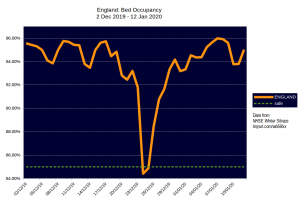The chronic and continued shortage of front line acute beds in NHS hospitals are times of highest demand are no longer restricted to the winter months. There has been a growing trend of hospitals nursing patients in corridors, despite warnings from the Royal College of Nursing.
“Patient safety is being compromised too often at present,” according to Dave Smith, Chair of the RCN’s Emergency Care Association.
He told Nursing Notes “Having to provide care to patients in corridors and on trolleys in overcrowded emergency departments is not what we came into nursing for. It’s not just undignified for patients, it’s also often unsafe.
Perhaps it’s no surprise to find that the RCN’s focus is on the numbers of nurses (“this problem isn’t going to go away unless we can increase the number of nurses in the health service.”) rather than the supply of sufficient beds in properly-appointed wards, as argued for by the Royal College of Emergency Medicine. It’s hard to see an increase in staff on its own being sufficient to get patients off trolleys.
The continued increase in average bed occupancy levels, and the much worse performance on waiting times for the more serious Type 1 A&E patients, many of whom have to wait for beds long after the decisions to admit them point to this as the underlying problem, although obviously more beds without sufficient nursing and other staff to care for the patients is no solution either.
Nursing Notes also reports on the email sent by an advanced nurse practitioner in Grimsby Hospital begging senior trust management to come in at a weekend and “see for themselves how unsafe it is.”
Her letter powerfully describes a situation which many A&E staff will find familiar:
“Your hospital is full – your A&E department is overflowing. But no further staff have been provided in A&E.
“You are concentrating on urgent treatment care and minors – this really is not the issue and if you continue to focus in this area someone will die.
“You are expecting staff to manage treble the number of patients in majors and resus that they would do normally, without breaks, this is not safe.
“They cannot provide that care – which is evident. The staff are trying their hardest and working to actual breaking point.”

Dear Reader,
If you like our content please support our campaigning journalism to protect health care for all.
Our goal is to inform people, hold our politicians to account and help to build change through evidence based ideas.
Everyone should have access to comprehensive healthcare, but our NHS needs support. You can help us to continue to counter bad policy, battle neglect of the NHS and correct dangerous mis-infomation.
Supporters of the NHS are crucial in sustaining our health service and with your help we will be able to engage more people in securing its future.
Please donate to help support our campaigning NHS research and journalism.


